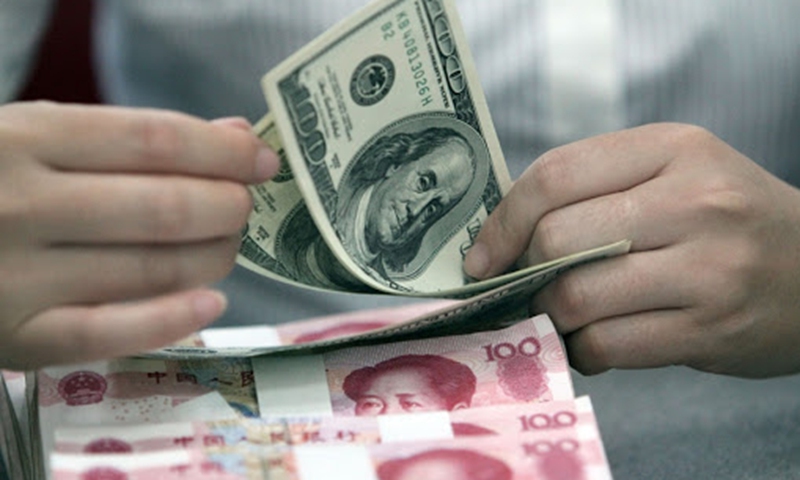Overseas income earned by Chinese residents come under tougher regulatory purview
Source: Global Times Published: 2020/7/17 0:42:50

Photo: Xinhua
Multiple Chinese-invested institutions in Hong Kong are said to have lately urged their mainland employees to declare income received overseas in accordance with the nation's new individual income tax law, stirring concerns over potentially higher tax burdens.
The toughening of tax rules don't target mainlanders residing in Hong Kong, but all Chinese taxpayers with foreign income, and are part of efforts to align domestic tax rules with international practices and provide fairer taxation, experts said.
June 30 was the deadline for the first final tax settlement since the new individual income tax law came into force on January 1, 2019. Numerous financial institutions including the Industrial and Commercial Bank of China (Asia), ICBC International, China Construction Bank (Asia), and Bank of China (Hong Kong) have issued notices since late June requesting outbound assignees to file consolidated domestic and overseas income, Chinese financial news site caixin.com said in a report earlier in July. The notices suggest taxpayers will have to make supplementary payments covering the balance between taxes on overseas gains and Hong Kong taxes.
An internal notice seen by the Global Times showed a conglomerate with a variety of operations in the mainland and Hong Kong informed all of its employees in Hong Kong categorized as mainland talent and professionals to file their overseas income earned in 2019 before July 10.
Their overseas income received in Hong Kong in the local tax year from April 1, 2018 to March 31, 2019 ought to be consolidated with their domestic gains in 2019 for tax calculation denominated in the yuan, read the notice, which cited an announcement in January by the Ministry of Finance and the State Taxation Administration.
The fundamental tax principle on how domiciled individuals are taxed in China actually remains unchanged under the new individual income tax law, while the January announcement provides more detailed guidance on how income earned overseas is taxed, Jacky Chu, PwC China Global Mobility Services Leader, told the Global Times.
There are a few major highlights under the new rules, according to Chu. The announcement requires the employing entities in China to report details of the outbound assignees to the in-charge local tax bureau by 28 February after the tax year concerned. It also requires the resident individuals who have overseas income to perform the annual reconciliation filing during the period from 1 March to 30 June after the tax year concerned.
The announcement crystallizes the tax policy for overseas income received by resident taxpayers. In a tax alert posted on KPMG's website in February, the accounting firm said the announcement "clarifies relevant rules on foreign tax credit claims and administrative procedures," complementing the nation's individual income tax reforms and resolving transitional issues.
Tax reporting requirements under the new law concern some mainlanders working and residing in Hong Kong, especially those directly hired by local firms as opposed to employees assigned overseas by mainland headquarters, said an employee of a local financial institution who hails from the mainland and is set to qualify for permanent residence in Hong Kong.
Individuals are taxed per month at a progressive rate capping at 45 percent according to the new law, while personal income is taxed also at progressive rates ending at 17 percent in Hong Kong.
Currently, most of the Chinese-invested institutions cover the additional tax payments resulting from the tax declaration, but there are concerns that mainland employees with non-Chinese institutions might be asked to file taxes according to the same standards, meaning they are most likely subject to higher tax burdens, the employee told the Global Times.
He is also concerned that he might be ordered to pay supplemental taxes when he is registered a permanent resident in the city while forfeiting his hukou in the mainland.
There would be cases where some residents will pay higher taxes and it's also likely they would get tax refunds, Zhu Weiqun, a professor of the School of Public Economics and Administration at Shanghai University of Finance and Economics, told the Global Times on Thursday.
The regulatory tightening, applied to all Chinese taxpayers, is intended to enable a fairer taxation regime to align domestic regulations with internationally prevailing practices, Zhu said, citing the present 183-day residency for defining tax residence, a major change from the previous rule of a stay for 365 days in the country in a tax year.
By law, China-domiciled individuals are subject to China individual income taxation on their worldwide income and this has always been the case before or after the new individual income tax law. However, if they paid foreign tax on overseas earned income, foreign tax credit can be claimed to avoid double taxation, Chu explained.
"We understand that many Chinese companies were approached by the Chinese tax authorities for the 2019 annual reconciliation filing to ensure their outbound assignees are in compliance with the announcement. Hence, we expect that more companies may be taking similar action to remind their employees to comply with the requirements," Chu said.
Also, these companies are advised to review their global mobility policy in light of the latest change in practice as it is believed that the enforcement effort will be tightened in the coming years, he added.
Posted in: ECONOMY